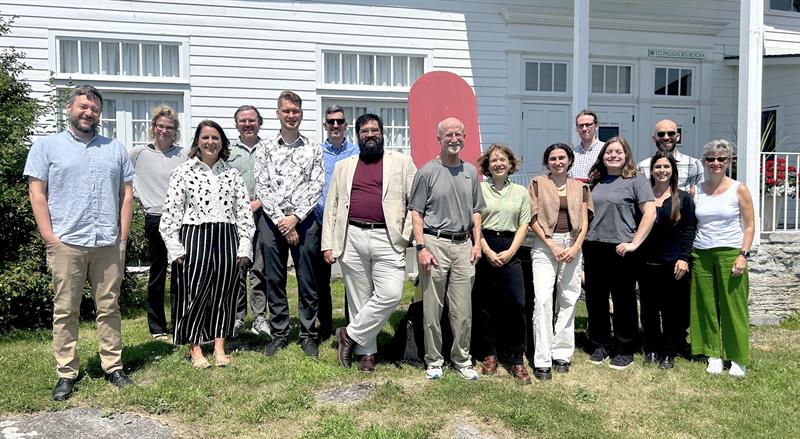
VCBH Faculty and Fellows with Guest Speakers Cecilia Bergeria and Mikhail Koffarnus at the 2025 Scientific Trainee Retreat
History
VCBH evolved from the UVM Human Behavioral Pharmacology Laboratory (HBPL), established by Dr. Higgins and colleagues in 1987. Over the next 10-15 years, HBPL gained prominence as a center of research and mentoring excellence in addictions with an innovative theoretical orientation grounded in behavioral economics and behavioral pharmacology. Over time, HBPL research evolved to increasingly focus on vulnerable populations (e.g., pregnant women, individuals with serious mental illness) and health outcomes (e.g., birth outcomes, breastfeeding, hospitalization rates). This emerging body of research demonstrated (a) that interventions that include immediate rewards for healthy choices in the form of short-term financial incentives can be highly efficacious at changing recalcitrant, unhealthy behavior; (b) that these interventions leverage for therapeutic purposes the same decision-making bias for smaller but more immediate rewards over larger but delayed rewards (i.e., delay discounting) that underpins risk for a wide spectrum of unhealthy behavior; and (c) that incentive-based interventions are highly effective in socioeconomically disadvantaged populations thereby helping to reduce health disparities. These developments fostered interdisciplinary collaborations between the Department of Psychiatry's addictions group and investigators from multiple UVM academic departments including ObGyn and Reproductive Sciences, Nutrition, and Cardiology, and a broadening of expertise into neurobiological mechanisms underpinning vulnerability, addiction and women’s health, and innovative pharmacological interventions for substance use disorders.
VCBH Today

The VCBH resides within the Robert Larner, MD College of Medicine at the University of Vermont, with the director and administrative offices being located within the Department of Psychiatry. Participating investigators, collaborators, and advisors include more than 20 faculty from seven academic departments and three colleges within UVM. The VCBH is further strengthened by interdisciplinary collaborations with other institutions of higher education such as Brown University, Johns Hopkins Medicine, and University of Kentucky as well as key community healthcare leaders and distinguished scientific advisory panels.

The focus of the VCBH is on investigating relationships between personal behaviors and risk for chronic disease and premature death, with a specific focus on understanding mechanisms underpinning risk, and developing effective interventions and policies to promote healthy behavior. A common thread across VCBH research projects is the application of knowledge from the disciplines of behavioral economics and behavioral pharmacology to: (a) increase understanding of vulnerability to unhealthy behavior, and (b) the use of incentives and other behavioral and pharmacological interventions to support healthy behavior change interventions and policies.
The contribution of socioeconomic factors to vulnerability and the need for interventions and policies to promote health and reduce disparities in disadvantaged populations is an overarching VCBH focus. To our knowledge, the VCBH is the only NIH-funded center that is applying the disciplines of behavioral economics and behavioral pharmacology to tackling these enormous, interrelated U.S. public health challenges.